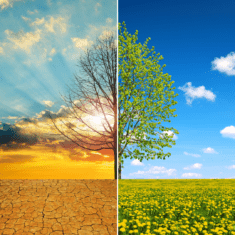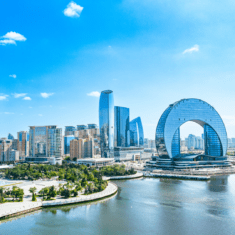

The United Nations Climate Change Conference -COP29 in Baku, Azerbaijan, is raising questions and concerns among commentators.
An event designed to address one of humanity's most pressing problems - the climate crisis - is viewed by many as turning into an arena for political games, raising doubts about the effectiveness and appropriateness of such meetings.
Civil society representatives, from environmental activists to human rights defenders, expressed concern about the limitations and difficulties they face in trying to influence the climate agenda, while political leaders take center stage.
Some of the main points brought up by campaigners are the following:
For nearly three decades, climate conferences have nominally sought to create a fair and collaborative effort to combat global warming. However, many in civil society feel that their voices remain muted and suppressed by government interests and the influence of international powers.
Activists and non-governmental organizations from countries with different levels of development are demanding fair representation at the COP29 and insisting that climate negotiations become truly transparent and accessible. Without meaningful civil society participation, the conference risks becoming a closed meeting for states and corporations rather than a platform for all stakeholders concerned about the future of the planet, as highlighted by COP29: What you need to know about the global climate summit - Amnesty International
The choice of Azerbaijan as the host country for the COP29 has caused concern. Critics point to the state's questionable record on transparency and respect for human rights. In a country where political repression and restrictions on civil liberties have become the norm, the authorities claim to be ready to lead discussions on transparency in climate finance.
However, internal government actions suggest otherwise. Civil society members and activists in Azerbaijan are facing increased repression on the eve of the COP29, including increased detentions and a crackdown on dissent. The international community is watching the situation closely, wondering whether Azerbaijan will be able to honorably represent its stated values of transparency on the global stage.
For the Azerbaijani leadership, the COP29 is not just a climate conference; it is an opportunity to present the country as a global leader on the climate agenda.
Nevertheless, The Economist argues that Azerbaijan is using the event to ‘greenwash’ its image. Furthermore, despite promises of climate leadership, the Azerbaijani authorities are simultaneously in favour of expanding oil and gas exports, which contradicts the goals of the COP.
This apparent paradox arouses scepticism, and many see COP29 as a platform for international prestige rather than for real action on climate change. For example, this article provides an insight into the role of corporations in climate talks.
Despite promises by rich countries to allocate funds for adaptation and mitigation, the actual distribution of these funds remains opaque and inequitable. Activists emphasise that without a transparent and equitable distribution of climate funds, vulnerable countries in the Global South will continue to bear the brunt of climate change impacts. The COP29 must address this inequity by implementing stricter standards of transparency in climate finance and ensuring that funds reach the communities and projects that need them most.

Baku, Azerbaijan
Civil society representatives insist that climate finance must not only increase but also become accessible to organisations working in affected regions. Even the World Economic Forum is dicussing such challenges in the context of climate conferences.
Much of the participation in COP29 is from the private sector, and multinational corporations are keen to showcase their climate initiatives. However, as noted many times, many of these corporations operate in regions with limited accountability, contributing to environmental degradation while claiming leadership in sustainable development. Activists are calling on companies to go beyond superficial greenwashing and take concrete and effective action. For corporations, COP29 represents an opportunity to move from self-parody to real climate action, but the question remains: will they seize the chance or use the event to create a positive image? You can read more about these civil society efforts here: Civil society calls for inclusive climate action ahead of COP29 | Republica
As highlighted by ‘Real risk’ that climate aid talks will fail, key COP29 negotiator warns – POLITICO has already labelled COP29 a possible ‘failed COP’, fearing that political maneuvering will overshadow genuine climate commitments. The timing of the event, amid ongoing global conflicts and geopolitical tensions, diverts attention from urgent climate goals.
However, the hope remains that the meeting will deliver more than handshakes and diplomatic rhetoric. The real test is whether the event can overcome political barriers, provide true transparency and promote climate justice that supports vulnerable communities and civil society worldwide.
The impact of COP29 it is not without importance. There is an opportunity for civil society organisations to highlight gaps in climate finance, inequalities in representation and the need for real climate action. Activists plan to use the attention in Baku to highlight these issues and make the voices of marginalised groups heard.
COP29 may not solve the climate crisis, but it can be a platform to call for accountability and a more inclusive, effective approach to the planet's most pressing problem. Only by bridging the gap between governments, corporations and civil society can people hope to make meaningful progress - and avoid turning the COP into another missed opportunity.
To find out more, here is a list of resources to explore further for the topics surrounding COP29:
COP29 chief secretly filmed promoting fossil fuel deals
Civil society calls for inclusive climate action ahead of COP29 | Republica
COP29: What you need to know about the global climate summit - Amnesty International
COP29: Why it matters and 4 key areas for action | World Economic Forum
‘Real risk’ that climate aid talks will fail, key COP29 negotiator warns – POLITICO
Professionnelle expérimentée avec plus de 10 ans dans la gestion de projets du secteur du divertissement et des services, je suis spécialisée dans le développement d'initiatives commerciales innovantes et l'adaptation aux tendances du marché. Grâce à mon esprit entrepreneurial et mon engagement envers le progrès continu, j'ai démontré ma capacité à améliorer la rentabilité, la satisfaction client et l'efficacité opérationnelle des entreprises.